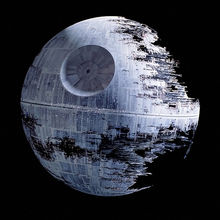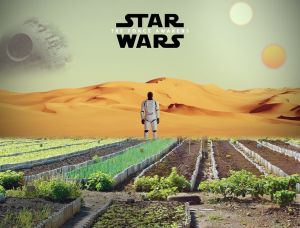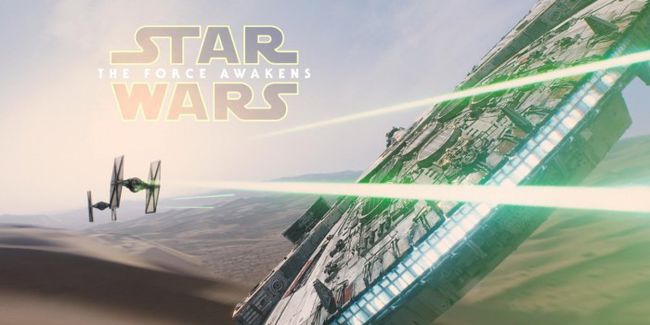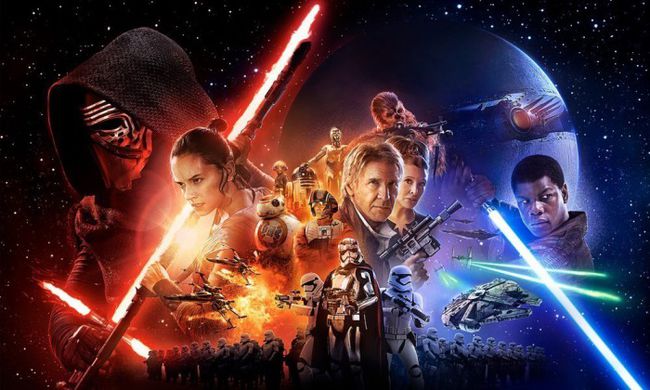6 Jan 2016
A Transition review, in 7 Episodes, of ‘Star Wars: The Force Awakens’

**Warning: SPOILER ALERT: if you don’t want to know what happens in the new Star Wars film, don’t read this. **
Like so very many people, I fell for the hype, and at vast expense, took my kids to see the new Star Wars film, ‘The Force Awakens’, just before Christmas. Although occasionally entertaining, and a mildly diverting way to pass 2 hours, it was also, if we’re honest, a bit crap, and I thought it might be fun to ease my way back into 2016 blogging by offering some Transition-related thoughts on it.
Episode One: Haven’t we been here before?
In the first Star Wars film, which I saw when I was about 8, super-nasty Imperial bad guys built a huge space station with a secret weapon on it and were about to start wiping out people all over the galaxy, when some plucky rebels, aided by a Complete Nobody from a remote planet who amazingly found they had ‘The Force™’, found that this space station had one tiny weak spot which, against all the odds, they found, dropped a bomb in and blew it up. The story of the new one is virtually the same, except that the Nobody with The Force this time is a woman, and the space station thing is many times larger than the original Death Star and has, predictably, a more hideous weapon. Am I the only person who sat watching this with an acute sense of deja vu?
Episode Two: Does nobody learn the lessons of the past?
 Did no-one learn anything in the intervening years since the events of the first movie? I have to say, if I were on the senior command of the Dark Side, once my beautiful Death Star (the size of the Moon remember) had been blown up by one tiny Rebel fighter dropping a bomb down a chute, thereby wrecking what must have been many decades of bloody hard work, a vast amount of precious resources and an unimaginable amount of money (imagine insuring that thing), that top of my list of instructions to the architect of the new improved one would be “this one does not have one of those chutes”. “Definitely no chutes”. But in this new film, the new base, the quaintly-named ‘Starkiller Base’, has another of those chutes. I’d say that architect should be checking his professional liability insurance.
Did no-one learn anything in the intervening years since the events of the first movie? I have to say, if I were on the senior command of the Dark Side, once my beautiful Death Star (the size of the Moon remember) had been blown up by one tiny Rebel fighter dropping a bomb down a chute, thereby wrecking what must have been many decades of bloody hard work, a vast amount of precious resources and an unimaginable amount of money (imagine insuring that thing), that top of my list of instructions to the architect of the new improved one would be “this one does not have one of those chutes”. “Definitely no chutes”. But in this new film, the new base, the quaintly-named ‘Starkiller Base’, has another of those chutes. I’d say that architect should be checking his professional liability insurance.
And the Starkiller Base is way bigger than the Death Star, looking to me about the size of Neptune. If the recent floods in the UK are anything to go by, if they had managed to insure the soon-to-be exploded Death Star, you can only imagine the rolling of eyes and sharp intakes of breath when Darth Vader trolled into the insurance company office with the Starkiller Base plans.
Episode Three: Get thee behind me, Limits to Growth
Nowhere in Star Wars do we get a sense of what’s powering the whole thing. Some seemingly abundant energy source that appears to be universally available, not requiring filling stations, never a limit to anything. No-one seems to get energy bills. They seem to have mastered ‘free energy’, yet unlike the utopia imagined in nonsense like the film ‘Thrive’, what has happened is that the poorer people have less of it, and the industrial military complex has used it to take over the universe. Imagine that.
We are taken beyond a world of limits where, provided you are evil enough, you can somehow cobble together enough hi-tech materials and resources to build a new planet in space. At present, we struggle to even build an International Space Station, which is about the size of a football pitch. Yet within about 40 years since the Death Star exploded, its Neptune-sized replacement has been cobbled together. George Osborne would be thrilled. That’s what I call a Northern Powerhouse.
Even the rebels, living in a desert or in a forest in the middle of nowhere, still have flying craft capable of travelling faster than the speed of light. And those certainly aren’t solar powered or running on woodland biochar, and there’s not a fracking rig in sight. The film sows that seed of possibility that a techno-utopia might be possible, when it so isn’t.
Episode Four: Er, isn’t it all just a little bit silly?
I wasn’t far into the film before I found I was finding it very hard to take Star Wars seriously, particularly once they reached the Starkiller Base, and were running around on it. I think Eddie Izzard’s sketch about Darth Vader trying to get served in the Death Star canteen has rather ruined it for me, making it hard to watch it without wondering what’s happening elsewhere on the Starkiller Base. Is there a swimming pool? Shops? How do they feed everyone? Where do they get their water from? Do they grow some of their food there, and how do they build soil? Do they get post? How do they unwind? Is there telly? Pizza? Can you go Ten Pin bowling? Do they do humanure composting out of necessity?
And then, by the time you’ve watched the more recent Robot Chicken Star Wars parodies, such as this one, the whole thing gets increasingly hard to take seriously:
Watching the 73 year old Harrison Ford running around the corridors of the Starkiller Base I found myself waiting for him to stop a passing Stormtrooper to ask where the loos were.
And the plot is just ridiculous. Rey, a young woman who grew up on a planet that’s basically a big desert with a market on it, finds that in spite of having no training at all, she’s an incredible Jedi who has mastered The Force (thereby making a mockery of the Jedi training schools in previous films and rendering Yoda redundant at stroke).
She randomly finds the old Millennium Falcon spaceship from the first film, which no-one has flown for many years, but is able to not just fix it up single-handed but then fly it incredibly skillfully. She doesn’t have an operating manual or a YouTube ‘how to’ video. Indeed, it doesn’t even look like she’s got the key, but somehow it starts first time. Even my car doesn’t do that.
Episode Five: The strange myths we tell (sell) ourselves
More seriously, Star Wars is a fascinating insight into the mindset of the United States. Here is the world’s greatest superpower, now with 800 military bases in 80 countries, and with its special forces active in 135 countries. Since 1945, it has started 81% of the wars in the world, many of them of questionable legality. A Gallup poll in 2014 asked people in 68 countries which nation it regarded as being the greatest threat to world peace, and the US was voted as being three times more dangerous than the next country.
 As Tom Engelhardt recently noted, the US is currently terrified of Islamic State. “The latest polls”, he writes, “indicate that striking numbers of Americans now view the threat of terrorism as the country’s number one danger, see it as a (if not the) critical issue facing us, believe that it and national security should be the government’s top priorities, and are convinced that the terrorists are at present “winning.” “But”, he continues, “the Islamic State should also be put in some perspective. It’s not Nazi Germany. It’s not the Soviet Union. It’s not an existential threat to the United States”.
As Tom Engelhardt recently noted, the US is currently terrified of Islamic State. “The latest polls”, he writes, “indicate that striking numbers of Americans now view the threat of terrorism as the country’s number one danger, see it as a (if not the) critical issue facing us, believe that it and national security should be the government’s top priorities, and are convinced that the terrorists are at present “winning.” “But”, he continues, “the Islamic State should also be put in some perspective. It’s not Nazi Germany. It’s not the Soviet Union. It’s not an existential threat to the United States”.
In Star Wars: The Force Awakens, our heroes are the small rebel army, who, on the rare occasion they all gather together in one place, a forest clearing, look to have a base about half the size of the Big Green Gathering festival (and some similarly outlandish costumes), a few crappy looking spaceships and a couple of robots, yet who take on, and defeat, a superpower capable of building a new planet the size of Neptune with a death ray capable of destroying whole solar systems. We love rooting for the little guy.
But this is not a film that invites a US or European audience to reflect on the fact that its role in the world is definitely more Starkiller Base than Rebel Army. We still like to see ourselves as, and to identify with, the small plucky underdog, in spite of being nothing of the kind. Proposed international trade deals like TTIP are not the work of small bands of rebel heroes living in the woods. Nor are drone strikes, or, indeed, super powerful death ray weapons such as international finance.
And the film is made by Disney, the Starkiller Base of the entertainment industry. Might this suggest that many people working inside that behemoth secretly yearn to be part of a small independent swashbuckling film company? Rather like when G8 ministers visiting Ireland were driven past boarded up shops whose windows were covered with stickers to make them look like traditional butchers/bakers/whatever, leading me to conclude:
“…even G8 ministers would rather pass through High Streets populated with small, independent butchers, bakers, grocers, would rather see shop windows overflowing with delicious food, trusting that the relationship they have built up with the shopkeeper over many years will mean that he/she stocks the best produce they can find. It feels right. It’s human scale. It makes sense”.
To be told by vast corporations and Empire nations such as the US that the ideal is the small, plucky, values-driven, passionate, independent sector, at the same time as they are relentlessly pushing all those things to one side does stick in the craw somewhat.
Episode Six: There’s no space in space
It is a film that is utterly relentless. Everyone is always dashing around, things are exploding, people are whizzing about. Even the 73 year old Harrison Ford is continually dashing around, and remaining remarkably unpuffed. But no-one ever gets to sit quietly and chat with someone else, to have a good catch-up in a hot tub or over a cup of tea (or whatever passes as tea on a planet that is entirely made of sand). When everything is relentlessly highly paced, I find myself getting bored. More explosions! More fight scenes! More dogfights! More battles! Yawn.
Eddie Izzard points us to something at the heart of this for me. We are people, as, however supposedly distant from us in time and space, are the characters in Star Wars. It is in the quiet spaces that the insight happens. How might the Rebel Army hope to meaningfully destroy this vast Empire without any space to reflect on how it works, who it is, what its values are? How does it model, as an organisation, a different world from that being modelled by the Empire? As Sophy Banks writes in her editorial to our new theme of Burnout and Balance, “how we might create a culture in Transition where there is no burnout?” How do the good guys model the Force in what they do?
In its defence, the film does open with the potentially interesting thread of a Stormtrooper who decides he just can’t do it anymore, a moral crisis of confidence. It would have been fascinating to take that further, but all that happens is he goes over to the good side and the fighting resumes. What was the nature of that inner turmoil? Could he really be the only stormtrooper on the whole of the Starkiller Base (the size of Neptune remember) to be experiencing any doubts over Darth Vader’s ethical policies (or lack thereof?) Might it be something regularly discussed in whispered conversations in the Starkiller Base sauna, or over a few pints of whatever passes as beer in space in one of the many bars there?
Episode Seven: That’s all folks
By now you’ve probably guessed I didn’t really fall for The Force Awakens’ many charms. I don’t think it serves us much to see ourselves as the plucky heroes in the woods, and if those of us working to stop the worst of climate change from coming to pass paint ourselves as such it really doesn’t move us very far forward. I would rather hear the stories of the people on the Starkiller Base finding the spaces to explore their doubts, I’d rather hear the quiet spaces between the Rebels, hear the story of the people growing Russian Kale in the greenhouses on the Starkiller Base. Our tendency to take polarised positions makes for more exciting films, but isn’t useful in a world where building common ground is one of the most vital things we can do. My suggestions for the title of the next film? “Star Wars: Mulch of the Sith”? “Star Wars: the Empire strokes backs” (nice, I rather like that one)? Or “Star Wars: Revenge of the Scythe”?
My thanks to other members of the Transition Network team whose collective reflections on the film helped shape this piece.

